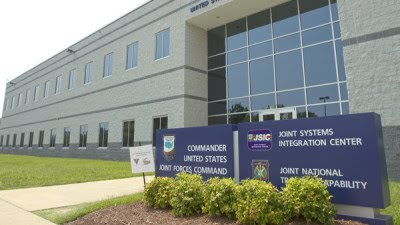before Sept. 1, according to a memo being circulated to local and state officials.
Military and Federal Facilities Alliance does not cite a source, but claims to have "strong evidence" that the controversial move is being fast-tracked.
"There is a package being prepared fairly vigorously to get in front of the president on about September 1 for him to approve the elimination of Joint Forces Command," said Frank Roberts, executive director of the alliance, when asked about the memo.
Virginia's congressional delegation has vowed to oppose the closing – even taking it to court -- but a Sept. 1 decision means that the commander-in-chief would have signed off before Congress returns from its recess.
Under this scenario, job losses would begin after the start of the new year, the memo says.
Also on Friday, a new report put a value on an even more frightening economic scenario: that the closing of JFCOM could drive away Norfolk-based NATO's Allied Transformation Command. Norfolk Mayor Paul Fraim has been among those raising this concern.
The one-page economic brief from the Hampton Roads Planning District Commission doesn't speculate on the possibility of that happening or get into the complex politics of it.
But it says the two organizations combined contribute $901 million to the gross regional product, about 1.2 percent, with more than $500 million in contracts being awarded annually.
JFCOM itself employs about 5,600 people in Hampton Roads, the bulk of them civilians or contractors. It has an annual operating budget of nearly $704 million.
Senior leaders back plan
The alliance's memo says the decision has the backing of senior military leaders and is supported by a five-month internal Defense Department study, the results of which have never been publicized.
Defense Secretary Robert Gates announced two weeks ago that he wanted to close JFCOM as part of overall cost-savings plan. He said the role of the command, which trains the military fight effectively together, is no longer needed because joint operations are now a part of the military culture.
Roberts said the memo was issued to put mayors, township supervisors and state officials on notice that they need to contact the White House sooner rather than later.
"We need our elected officials engaged as quickly as possible to attempt to slow down and delay this process such that it doesn't get so far out of the barn that it comes out not even negotiable – or discussable," he said.
Bruce Sturk is the director of federal facilities support for the city of Hampton and a 26-year Air Force veteran. He said the JFCOM issue requires "a strategic pause" and seems to defy standard procedure.
"This train is moving really fast," he said.
While it's important to keep on top of all news – and even rumors – regarding JFCOM, Sturk said he takes everything with a degree of skepticism until he sees official documents.
The memo goes on to say that Marine Gen. James Mattis, the most recent JFCOM commander, had "significant input" throughout the process.
Divest Suffolk facility
The five-month study was purportedly done by Christine Fox, who directs of the office of cost assessment and evaluation at the Pentagon.
The study says that JFCOM's mission of providing forces should be reassigned to the individual services. Its experimentation role would be eliminated. The Joint Warfighting Center in Suffolk has "value," but the Pentagon "wants to divest the leased space so it could potentially go anywhere," the memo says.
The most breathless sentence of the memo is the last one, that Gates "is considering a move to mothball the Second Fleet," which is based in Norfolk.
Roberts said that doesn't mean ships would be idled.
"My sense would be that that comment relates to disestablishment of the Second Fleet staff," he said.
Circumventing Congress
U.S. Rep. Robert C. "Bobby" Scott, D-Newport News, said that he has not seen any study and questioned why it would be done in secret. The timing of the move appears designed to circumvent Congress, which is in summer recess.
"The initial announcement was made right after we left town and the decision will be made before we get back," he said. "It adds to the mystery of it. You ought to be able to have a public discussion."
Scott said he wasn't surprised that Obama would agree with Gates' recommendation.
"If the secretary of defense proposes it, you assume that it's the administration's position," Scott said, noting that sometimes those decisions can be "delayed or even reversed."
Scott said Gates' plan to save money remains in doubt because the Pentagon has not detailed any savings.
"We don't know the economic impact because we don't know what functions will continue," he said.
Scott said the lack of detail from the Pentagon is frustrating.
"This is part of the problem. We're trying to respond to rumors," Scott said. "How do you intelligently respond to rumors? It's a rumor – I'm against it?"
www.dailypress.com
 Even in the midst of a tough re-election campaign, Congressman Glenn Nye is still working to keep the Joint Forces Command in Norfolk open. JFCOM accounts for 42% of the 2nd District's GDP.
Even in the midst of a tough re-election campaign, Congressman Glenn Nye is still working to keep the Joint Forces Command in Norfolk open. JFCOM accounts for 42% of the 2nd District's GDP.
